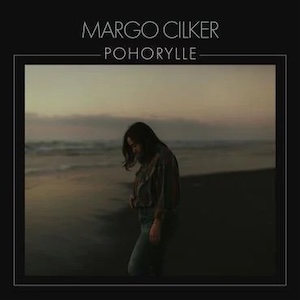
Margo Cilker – Pohorylle
Loose Music – 5 November 2021
Hailing from Eastern Oregon for several years, Margo Cilker has spent much of her time on the road. Following on from three EPs, she makes a hugely impressive full-length debut with Pohorylle, an album of original songs that draw on her experiences as a touring musician and such influences as Lucinda Williams, Townes Van Zandt and Gillian Welch. It was recorded in the Pacific Northwest by Sera Cahoone and is abetted by a back-up band of Jenny Conlee from The Decemberists on keys, Son Volt pedal steel player Jason Kardong, bassist Rebecca Young, multi-instrumentalist John Morgan Askew, sister Sarah on harmonies and Mirabai Peart and Kelly Pratt on strings and horns, respectively.
The opening track, the jaunty fiddle, piano and acoustic strummed That River, refers to an old Basque hotel, the area of Spain where the backpack company of the same name’s located and is Pohorylle’s home from home. Essentially addressing love troubles, the track itself, however, refers to the Minam River in Oregon, which, treacherous in winter, she declares “could fuck me up/Crack my ribs, bust my lip”, as well as extra local colour in Mrs Z’s, a grocery store in Oregon’s Jordan Valley.
The album’s title also has a Spanish connection, named after the German-Jewish Spanish Civil War photographer Gerta Pohorylle. Pohorylle was the companion and professional partner of Endre Ernő Friedmann (more famously known as Robert Capa), although a significant amount of Capa’s work is hers. Pohorylle and Friedmann both worked under the name of Robert Capa, capturing vivid images of lives in the moment.
On then to the folksy Band-shaded Kevin Johnson, honky-tonk piano and fiddle providing an old school saloon country feel for a character sketch, inspired by someone from South Carolina but not an actual figure as such. Having had a cracked rib in the opening track, she now sings of a Broken Arm In Oregon, a trotting rhythm conversational memory of “being down and out in Carolina”, driving back to California, and “taking a tumble on the mountain” while out riding. More than that, it takes on suggestions of deeper trauma in the line, “Now every room she sleeps in, she’s gotta map out her escape plan”.
A song about restlessness (“if you’re staying stay, going go …don’t you forget you always come home”) , the slow waltzing, stripped back strummed Flood Plain, coloured by pedal steel and fiddle, the tempo shifts for the uptempo Tehachapi to a departing lover (“Wasn’t much of a warning/He disappeared one morning/Put his mattress up on the back of a pickup truck”). Adding Dixieland horns to the vibe, you will of course know, is the town mentioned in Little Feat’s Willin’, a fact she makes clear in the lyric “Told you I was willin’/But you heard strugglin’/Tell me how does a girl with a family like yours end up so desperate?/It’s these Little Feats/That keep me goin’”. The numbers a revisit from her acoustic demo version on last year’s self-released otherwise covers mini-album Songs From My Bucket where it sat next to the Lowell George song.
Slowing things back down to a dusty pedal steel enhanced country sway, Barbed Wire (Belly Crawl) takes its cue from writer Kim Stafford talking about eastern Oregon and how people negotiate a barbed wire fence, a man goes over, a child under and a woman through, Cilker adopting the metaphor to talk about feeling physically constrained (“If you knew what it was like to have/Both hands tied”) while her mind wanders free as she asks “Are we inside or outside the line”.
The pace remains steady for the waltz-time, snares brushed, achingly sung Chester’s, a number about loneliness (“I made my bed on the side of the road/I’ve seen my good friends get married and then feel alone/I’ve seen drunks in the wine and Chester’s eyes/I can’t let myself get lonely no more”).
Things then spark back up for the penultimate Brother, Taxman, Preacher, saloon piano and acoustic guitar, jogging things along in a melange of Caroline Spence country and The Band’s carnival groove as she casts a cynical eye over those who look to direct the way people live, sporting the snappy line “I wish I was a preacher – I could tell you who to love; I could tell you who to vote for, who to pity and who to fuck”.
And so then to the wistful steel stained slow waltz closer, Wine in the World, an introspective musing on how “I’m a woman split between places and I’m bound to lose loved ones on both sides”, or as the press blurb puts it, “upon the vast dichotomies of her selfhood and her profession”, as she sings “Putting some dreams out to pasture/I’m sending some dreams up the hill/Some dreams I’m going to soak then in water/They’ll be easy come the spring”. Extending the metaphor for life and its brief course, and reminiscing the loss of her grandfather, there is she says, a river of wine that flows out and that she is “a woman who drinks deeply”, yearningly adding, “I wish I had all the wine in the world”, a refrain that shifts in the closing seconds to “I wish I had all the time in the world”.
Sadness, yearning but also hope and desire, all essential strands of her vocal DNA as she sings of a restless spirit, both being held back and reaching out for something, Cilker’s taken her time readying this grander entrance onto the Americana stage. One of the year’s finest debuts, that stage is hers for the taking.
Pohorylle is out now on Loose Music

